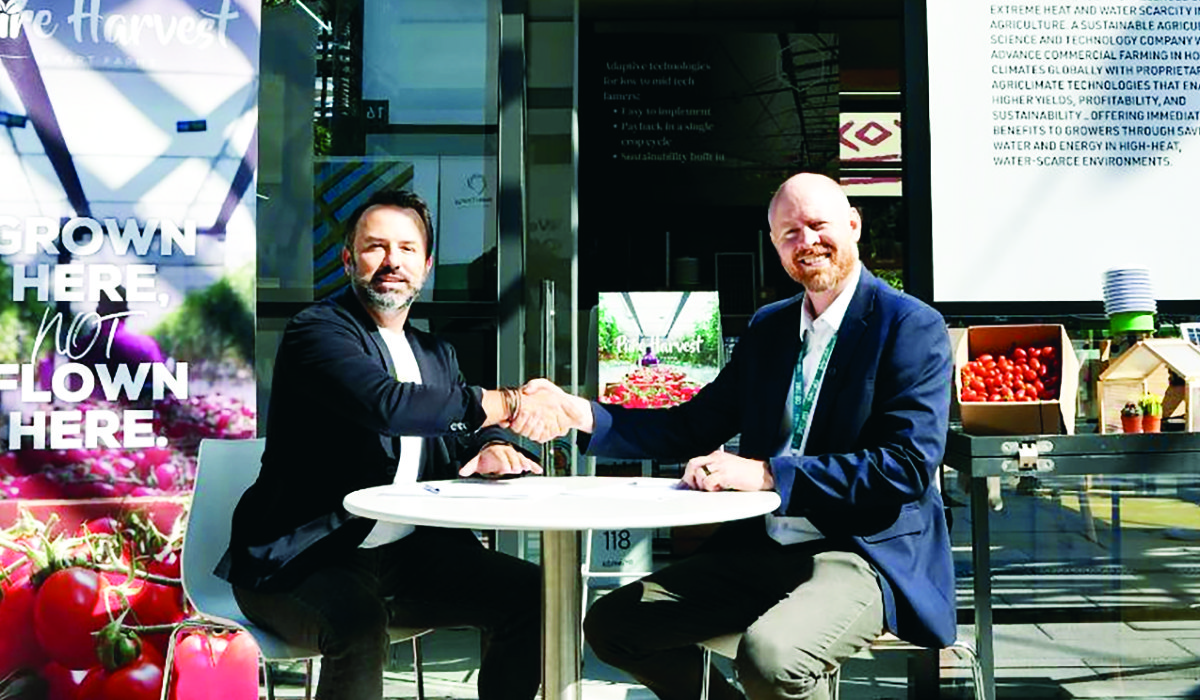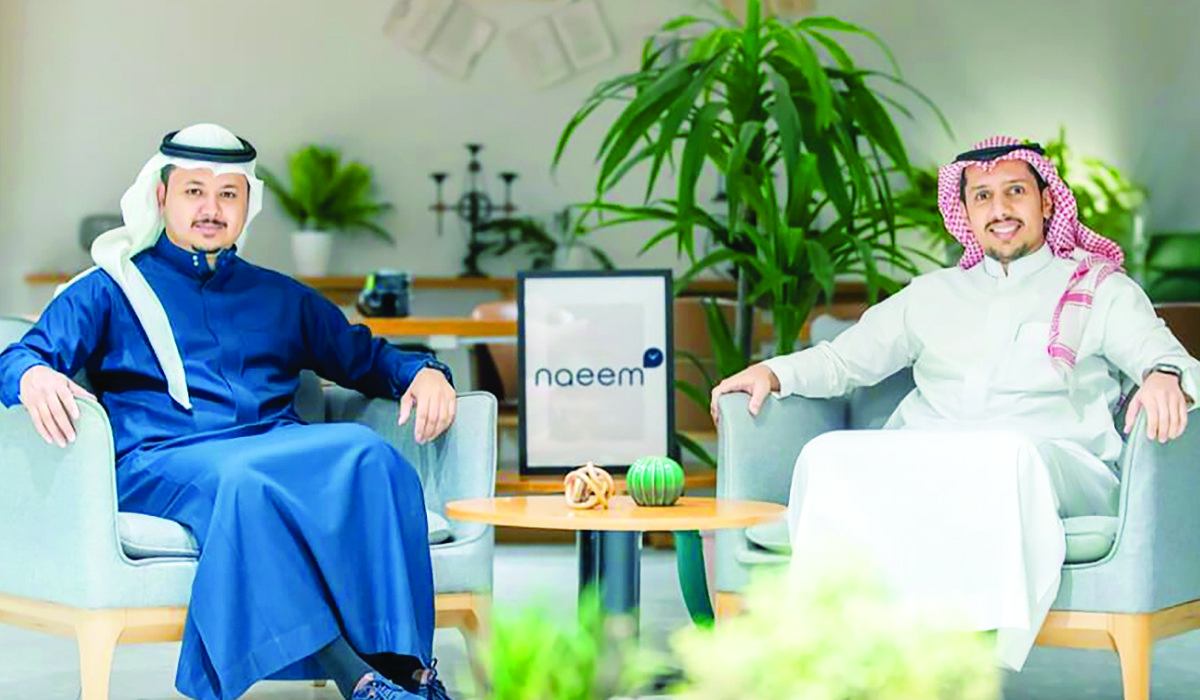CAIRO: The startup ecosystem in Saudi Arabia remains at the forefront of regional funding trends, attracting substantial investments.
Naeem, a Saudi Arabia-based software as a service platform targeting the salon and beauty sector, has recently closed an undisclosed pre-seed funding round led by Lunment and a group of angel investors.
Founded in 2022 by Abdullah Al-Mansour and Saleh Al-Butti, Naeem’s services, which cater to both customers and business owners, include point of sale systems, reservations, financial, and operational management.

UAE-based agritech Pure Harvest Smart Farms announced the acquisition of Red Sea’s production facility in Saudi Arabia to expand its farm footprint. (Supplied)
“We are pleased to close this financing round, which will help us expand and enhance our presence. This financing round reflects the great optimism and growing support for Naeem and represents an important turning point in our journey towards achieving success and innovation in this sector,” Al-Mansour said.
The company aims to utilize this funding to bolster its presence within the Saudi market.
“We are committed to providing the best digital solutions for the personal care sector. We can see that our solutions have helped salons and beauty centers improve their businesses and provide a better experience for their customers,” Al-Butti added.

Founded in 2022 by Abdullah Al-Mansour and Saleh Al-Butti, Naeem’s services include point of sale systems, financial, and operational management. (Supplied)
Lendo raises $28m for Shariah-compliant crowdfunding
Saudi Arabia’s Lendo, a Shariah-compliant debt crowdfunding marketplace, has raised SR105 million ($28 million) in a series B funding round led by Sanabil Investments, a company owned by the Public Investment Fund.
The round also saw contributions from Shorooq Partners, AB Ventures, and others.

Mohammad Jawabri, Lendo co-founder and COO
Founded in 2019 by Osama Al-Raee and Mohammad Jawabri, Lendo assists small and medium enterprises with digital pre-financing of invoices and offers quick, short-term cash borrowing options.
The fresh capital will aid Lendo’s expansion into new markets and the development of new Shariah-compliant products.
“The growing demand for alternative, agile, and accessible lending solutions presents a significant opportunity. At Lendo, we are well-positioned to lead the charge in promoting financial inclusion not only in Saudi Arabia but also beyond. By fueling SME growth, we aim to contribute to the realization of Saudi Arabia's Vision 2030 economic goals and to create a ripple effect of opportunity throughout the MENA (Middle East and North Africa) region,” said Jawabri.
The growing demand for alternative, agile, and accessible lending solutions presents a significant opportunity. At Lendo, we are well-positioned to lead the charge in promoting financial inclusion not only in Saudi Arabia but also beyond.
Mohammad Jawabri, Lendo co-founder and COO
Pure Harvest Smart Farms acquires RedSea’s CEA facility in Saudi Arabia
UAE-based agritech company Pure Harvest Smart Farms has announced its acquisition of RedSea’s controlled-environment agriculture production facility in Saudi Arabia.
Set to take over operations in January 2024, this move enables Pure Harvest to expand its farm footprint and benefit from RedSea’s SecondSky technology.
This technology, a heat-blocking roofing solution, boosts energy efficiency in greenhouses.
Founded in 2016 by Sky Kurtz, Mahmoud Adi, and Robert Kupstas, Pure Harvest specializes in hydroponic technology for growing fruits and vegetables in desert climates. The acquisition also includes a 40-hectare land bank co-located with the facility.
“This transaction allows us to double our footprint in the Kingdom and serves as a foundational deployment of our novel ‘franchise farming’ business model, a solution that has been under development for over two years,” Kurtz said.
Founded in 2018 by Mark Tester and Ryan Lefers, RedSea utilizes salt water to grow local produce more sustainably to reduce carbon emission and resource scarcity.
“We always planned a transition from farm operator to a pure-play technology company. In Pure Harvest, we have found a custodian for what we have built in the Kingdom to-date, including our fruitful partnership with Alajaweed Farm,” Lefers stated.
Pala De 7 raises $1m to create padel community platform
Saudi-based startup Pala De 7 raised SR3.75 million led by sports technology startup Grintafy Technology with participation from AlTahan and Shaghaf Investments.
The company aims to create a new community platform for Padel tennis players in the Kingdom.
Founded by Tarek Ashoor, Pala De 7 is set to launch its platform in early 2024 which will offer field registration, court booking, and matchmaking.
HyveGeo secures pre-seed funding led by SystemaNova.vc
HyveGeo, a UAE-based climate technology startup, has recently closed a pre-seed funding round, the amount of which remains undisclosed, led by SystemaNova.vc.
Co-founded in 2023 by Abdulaziz bin Redha, Samsurin Welch, Eva Morales, and Harjit Singh, the company focuses on using microalgae technology for soil regeneration and carbon removal.
HyveGeo plans to pilot its program in the UAE with this new funding.
Fundbot secures $1.5m for MENA expansion
UAE-based fintech Fundbot has raised a $1.5 million seed round led by Hambro Perks Oryx Fund, supported by Aditum Investment Management Limited, Flat6Labs, Middle East Venture Partners, and PlusVC.
Founded in 2020 by Karl Abou Zeid, Fundbot simplifies corporate lending and payments between banks, buyers, and sellers.
The investment is set to fuel the company’s expansion plans in the MENA region, starting with the UAE and Saudi Arabia and later extending to Oman, Bahrain, and Egypt.
Midori Network raises $200k for mobile recycling modules
Midori Network, a UAE-based climate tech startup, has secured $200,000 in pre-seed funding from Kirill Veselov, a former investment director at Mint Capital.
Founded in 2023 by Fedor Smirnov, the startup operates a network of container-based mobile recycling modules addressing the plastic waste problem in rural areas.
Part of the TECOM Group PJSC business incubator in5, Midori Network aims to expand its eco-conscious solutions globally with this funding.
Mubadala Capital joins $48m series A in Andalusia Labs
Abu Dhabi’s Mubadala Capital, a $280 billion global sovereign fund, has participated in a $48 million series A funding round for US-based blockchain startup Andalusia Labs.
The round also included Lightspeed Venture Partners, Pantera Capital, Framework Ventures, Bain Capital Ventures, and Digital Currency Group.
The new funding round puts Andalusia Labs at $1 billion valuation, marking it as a unicorn.
Co-founded in 2021 by Drew Patel and Raouf Ben-Har, the company specializes in risk management infrastructure for digital assets and plans to establish its global headquarters in Abu Dhabi Global Markets.
The funding will accelerate product development, enhance institutional partnerships, and support global expansion.
Terra raises $2m for electric mobility solutions
Terra, a UAE-based electric mobility company, has raised a $2 million seed round from a group of angel investors.
Founded in 2010 by Husam Zammar, Terra provides a battery swapping and recharging platform, alongside a fleet of electric vehicles.
This funding will be used to enhance its mobile application for riders and cloud-fleet management dashboard for operators in the last-mile sector.
Terra’s recent launch of its first fleet of electric motorbikes follows the successful completion of a pre-seed round earlier this year.




























